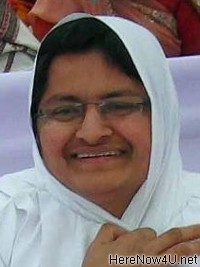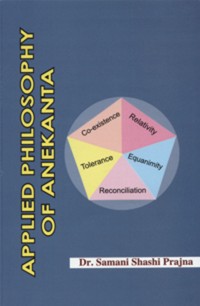Anekāntavāda implies liberalism. This principle classifies that only one aspect of a thing or issue may not be acceptable. Regarding any idea or proposition there may be two or more sides. Therefore, in order to reach a right judgment on a certain issue, we have to take into consideration its various aspects. In today’s democratic era, it is quite natural to have various points of view or a variety of opinions, regarding a certain idea. It may not be possible that the stand of a teacher or that of any student in a class will be accepted by all the students in the class. Therefore, it is necessary to consider the various views expressed by the students in a class. In reaching a decision each student should have the self-satisfaction that his viewpoints has also been duly considered. This feeling on the part of the student will promote the development of his personality and help in adopting a liberal attitude about things. In the modern style of teaching, the teacher should try to co-ordinate the various views of the student’s posing a consistency that is acceptable as a whole. Evidently, the same idea cannot be imposed on all students. Accordingly, we should instead of merely learning it, as a school of philosophy, treat it as a manual to guide our practical politics, economics, civics, sociology and ethics, and even physical science. Let not the light of anekānta remain hidden in the books of Jainism. It should be allowed to spread everywhere, without any inhibition of a label, a dogma, or a sect. Anekānta belongs to the whole humanity. The famous dictum of Tulsi is, “Reform yourself and the world will be reformed”. We are indeed passing through the most critical phase of human history, when the mankind is threatened with the nuclear catastrophe.
Let Mahāvīra’s message of understanding each other be our beacon light. Education is the most effective means of preventing intolerance. The first step in ‘tolerance education’ should be to teach people what their shared rights and freedoms are, so that they may be respected, and to promote the will to protect those of others. Education for tolerance should be considered as an urgent imperative. It is necessary to promote systematic and rational tolerance, teaching methods to address the cultural, social, economic, political and religious sources of intolerance. Education policies and programmes should contribute to the development of understanding, solidarity and tolerance among individuals as well as among ethnic, social, cultural, religious and linguistic groups.
Ācārya Mahāprajña a Jain Ācārya was on his Ahiṃsā March for the last five years and spreaded the message of universal brotherhood. Let us resolutely work for the universal friendliness of humanity and let this motivation transcend the national boundaries. Ācārya Mahāprajña also introduced Jīvan Vijñān, for the holistic development of personality. He emphasized on spiritual values to be integrated into the curriculum and not separated as an optional subject. They form core components of personal development and help in transformation of the students to a broader base of science and develops an understanding to handle the human relationships from the heart rather than the mind, that is presently needed.
 Dr. Samani Shashi Pragya
Dr. Samani Shashi Pragya

